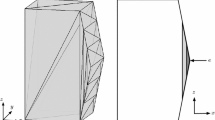Abstract
This paper proves the error reduction property (saturation property), convergence and optimality of an adaptive mixed finite element method (AMFEM) for the Poisson equation. In each step of AMFEM, the local refinement is performed basing on simple either edge-oriented residuals or edge-oriented data oscillations, depending only on the marking strategy, under some restriction of refinement. The main tools used here are the strict discrete local efficiency property given by Carstensen and Hoppe (2006) and the quasi-orthogonality estimate proved by Chen, Holst, and Xu (2009). Numerical experiments fully confirm the theoretical analysis.
Similar content being viewed by others
References
M. Anisworth and J. T. Oden, A Posteriori Error Estimation in Finite Element Analysis, Wiley, Chichester, 2000.
I. Babuska and W. Rheinboldt, A posteriori error estimates for the finite element method, Internat. J. Numer. Methods Engrg., 1978, 12: 1597–1615.
I. Babuska and W. Rheinboldt, Error estimates for adaptive finite element computations, SIAM J. Numer. Anal., 1978, 15: 736–754.
I. Babuska and T. Strouboulis, The Finite Element Method and Its Reliability, Clarendon Press, Oxford, 2001.
W. Bangerth and R. Rannacher, Adaptive finite element methods for differential equations, Lectures in Mathematics, ETH-Zürich. Birkhäuser, Basel, 2003.
C. Carstensen and J. Hu, A unifying theory of a posteriori error control for nonconforming finite element methods, Numer. Math., 2007, 107: 473–502.
S. H. Du and X. P. Xie, Residual-based a posteriori error estimates of nonconforming finite element method for elliptic problem with Dirac delta source terms. Science in China Series A: Mathematics, 2008, 51(8): 1440–1460.
K. Eriksson, D. Estep, P. Hansbo, and C. Johnson, Computational Differetial Equations, Cambridge University Press, Cambridge, 1995.
R. Verfürth, A Review of a Posteriori Error Estimation and Adaptive Mesh-Refinement Techniques, Wiley-Teubner, 1996.
J. M. Cascon, C. Kreuzer, R. H. Nochetto, and K. G. Siebert, Quasi-optimal convergence rate for an adaptive finite element method, SIAM J. Numer. Anal., 2008, 46(5): 2524–2550.
P. Morin, R. H. Nochetto, and K. G. Siebert, Data oscillation and convergence of adaptive FEM, SIAM J. Numer. Anal., 2000, 38(2): 466–488.
P. Morin, R. H. Nochetto, and K. G. Siebert, Local problems on stars: A posteriori error estimators, convergence, and performance, Math. Comp., 2003, 72(243): 1067–1097.
P. Morin, R. H. Nochetto, and K. G. Siebert, Convergence of adaptive finite element methods, SIAM Review, 2002, 44(4): 631–658.
C. Carstensen and R. H. W. Hoppe, Error reduction and convergence for an adaptive mixed finite element method, Math. Comp., 2006, 75: 1033–1042.
L. Chen, M. Holst, and J. C. Xu, Convergence and optimality of adaptive mixed finite element methods, Math. Comp., 2009, 78(265): 35–53.
D. Braess, Finite Elements, Cambridge University Press, Cambridge, 1977.
S. Brenner and L. R. Scott, The Mathematical Theory of Finite Element Methods, Springer, New York, 1994.
F. Brezzi and M. Fortin, Mixed and Hybrid Finite Element Methods, Springer, New York, 1991.
A. Alonso, Error estimators for a mixed method, Numer. Math., 1996, 74(4): 385–395.
C. Carstensen, A posteriori error estimate for the mixed finite method, Math. Comp., 1997, 66(218): 465–476.
B. Wohlmuth and R. H. W. Hoppe, A comparison of a posteriori error estimators for mixed finite element discretizations, Math. Comp., 1999, 82: 253–279.
P. Binev, W. Dahmen, and R. DeVore, Adaptive finite element methods with convergence rates, Numer. Math., 2004, 97(2): 219–268.
R. Stevenson, Optimality of a standard adaptive finite element method, Foundations of Computational Mathematics, 2007, 2: 245–269.
S. Mao, An optimally convergent adaptive mixed finite element method, Numer. Math., 2008, 111: 35–54.
R. Stevenson, The completion of locally refined simplicial partitions created by section, Math. Comp., 2008, 77: 227–241.
Author information
Authors and Affiliations
Corresponding author
Additional information
This work was supported in part by the Natural Science Foundation of China under Grant No. 10771150, the National Basic Research Program of China under Grant No. 2005CB321701, and the Natural Science Foundation of Chongqing City under Grant No. CSTC, 2010BB8270.
This paper was recommended for publication by Editor Ningning YAN.
Rights and permissions
About this article
Cite this article
Du, S., Xie, X. Error reduction, convergence and optimality of an adaptive mixed finite element method. J Syst Sci Complex 25, 195–208 (2012). https://doi.org/10.1007/s11424-012-9242-1
Received:
Revised:
Published:
Issue Date:
DOI: https://doi.org/10.1007/s11424-012-9242-1




